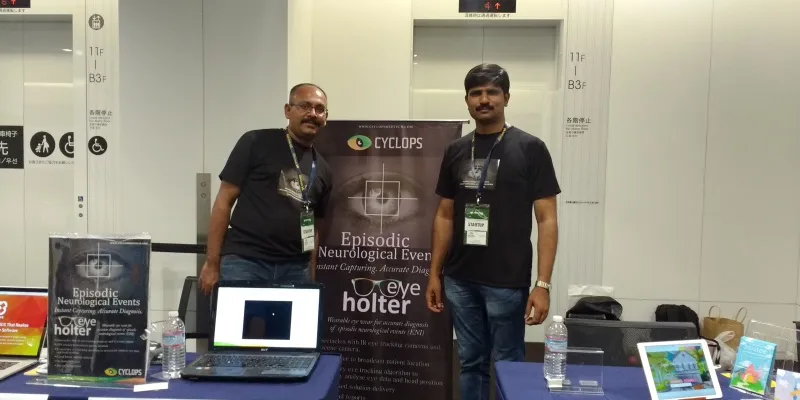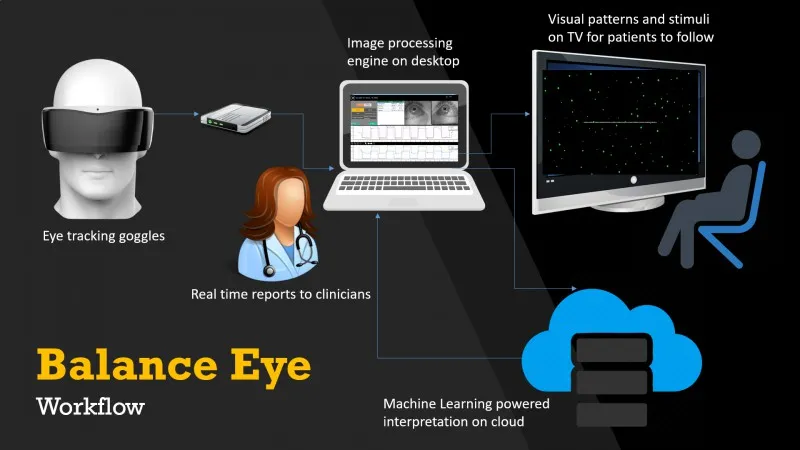Tech30 startup Cyclops plans to scale up production with recent funding
Cyclops Medtech completed its seed round by raising $1 million from Unitus Ventures last month. Existing angel investor CP Bothra also participated in the round.
Those suffering from vertigo, a sensation of spinning dizziness, often complain they cannot explain all the symptoms to doctors since the dizziness is temporary and lasts only for 20 seconds to one minute.
Cyclops Medtech, a 2015 Tech30 company, helps create an attack environment inside a clinic enabling doctors to perform tests and study symptoms in vertigo patients.
Founded by Dr DR Srinivas, Dr Ravi Nayar and serial entrepreneur Niranjan Subbarao, Cyclops Medtech focuses on building and manufacturing diagnostic solutions for episodic neurological events like vertigo, with the use of eye-tracking technology.
Last month the team raised a funding of $1 million led by Unitus Ventures. It will be using the funds to primarily consolidate its leadership position in the market, scale up the number of installations and expand to ASEAN and other markets abroad.
Over a span of 16 months, Cyclops’ product BalanceEye has had over 100 installations across 50 cities. The Tech30 startup also partnered with Mysore's Vinyas Innovative Technologies Pvt. Ltd. to manufacture its device. One of the company's engineers sits at the Vinyas factory for supervision. It has also trained a dedicated team to manufacture BalanceEye.
While certain components of BalanceEye are sourced from six different countries, the entire product integration and manufacturing happens in its factory in Mysore. Each batch manufactures twelve products. It takes a day to build one device. The company has so far manufactured twelve batches.

Recent developments
BalanceEye was launched in April 2017 at The Association of Otolaryngologists of India.
The first device was installed in large hospitals and individual clinics including Sakra World Hospital - Bengaluru, Amrita Institute of Medical Sciences - Kochi, Sri Ramachandra Medical College - Chennai and Bangalore Baptist Hospital, among others.
"Barring a few states in the North-East, Jammu & Kashmir and Chattisgarh, BalanceEye has been installed in every state," says Niranjan.
The team size has increased to 13 and apart from the co-founders, it has also appointed a Chief Technology Officer, Shekar Tippur, who specialises in cloud computing and data sciences. Another addition is software architect Ajith Rao who specialises in computer vision and image processing.
Working of the device
BalanceEye stimulates an attack environment in a clinic, when the doctor performs the tests. The patient is made to wear the device and sit in front of a screen and follow a set of vision stimuli that is displayed. As the patient follows the visual stimuli, the device captures the pupil images.
The images after being processed are sent to the cloud. The machine algorithm, further analyses the data which is then vetted by a team of clinicians. Clinicians and technicians are trained for free in every clinic and hospital where the device is installed.

BalanceEye's mirror-less design eliminates the need for mechanical adjustment of camera modules, reduces fogging and increases accuracy levels to a great extent.
Its noise elimination technology uses optical filters to cut down the noise, distortion and unwanted visual artifacts in the light stream, making it possible for the device to be used in any kind of light setting, without the need for dedicated physical infrastructure.
Clinicians can easily deploy the equipment in their OPDs without having to dedicate a room for balance assessment.
Numbers game
BalanceEye has a 62 percent market share and 60 percent of the installations have been made in non-metro cities and towns. While the founder refused to share the price of the product, Niranjan claims that BalanceEye comes at a 4x cost advantage compared to its competition.
The founders claim that the low cost reduces the diagnosis costs to patients by 50 percent and helps clinicians recover their investment within 12-18 months.
According to the founders, the device has performed 10,000 tests and the company's and the company's average month-on-month growth has been 15 percent last year.
The team had earlier raised an undisclosed seed round of funding in June 2016 from CP Bothra, Chairman and Managing Director of Medreich Pharma, a generic drug manufacturing major which was acquired by Japan's Meiji Seika. Cyclops Medtech had also raised a pre-seed round of funding, in 2015, from a leading surgeon in Bengaluru.
Market and competition
Healthcare has become one of India’s largest sectors both in terms of revenue and employment. The medical devices market in India, which was valued at $4 billion in 2016, is likely to cross the $11-billion mark by 2022.
Recently, a number of heathtech platforms have come up to diagnose and detect diseases with heavily funded ones like Practo, Lybrate and Portea leading the game. However, the medical device segment is still to have the same number of startups and investments.
The numbers are nevertheless growing. Docturnal has built a device TimBre that detects tuberculosis, Rayd8, is building smartphone-based retinal imaging; there is also the funded and famous Nephroplus, a unique dialysis service provider and a few others.
Future plans
Cyclops' eventual plan is to let patients take BalanceEye to their homes to record insights during a vertigo attack. The company also plans to scale up production.
The immediate plan, however, is to complete the development of two other products in the neuro-vestibular diagnostic space in a year, the details of which the founder declined to share.







